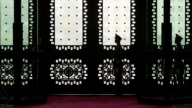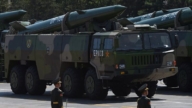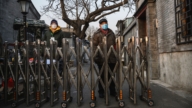【新唐人2012年11月21日訊】11月19號,中共喉舌《新華網》發佈消息宣稱:中共中央決定,周永康不再擔任「政法委書記」一職,改由「公安部部長」孟建柱兼任。這是「十八大」 後,中共宣佈的第一波人事變動。分析指出,周永康和其他常委一樣,屬正常任免,而政法委雖然降級,但是,鎮壓人們的功能並沒有改變。
早在「十八大」之前,各界就在預測,中央政治局常委席次將從9席變為7席,政法委和文宣部門將被消權。19號《新華社》報導,中央政治局委員、公安部部長孟建柱取代周永康,兼任政法委書記。分析認為,掌管政法委的一把手,不再由中共權力核心「政治局常委成員」擔任,因此可以確認政法委遭到降格。
時事評論家文昭分析,政法委的降級不是因為它危害了中國老百姓,而是因為它威脅了中央領導權威的緣故。
時事評論家文昭:「就是說要政法委的頂層人物、高層人物控制它的,目前都要換掉了,但是具體的執行層面,他的職能都沒有甚麼變化,目前來講,610這個系統仍然存在,這個維穩機制仍然在運作,所以他所有這些都是在它最後權力歸屬上把它做一些重新的調整,使它不至於對下一屆的中共領導人產生甚麼威脅。」
據了解,在80年代,政法委並不是一個引人注目的機構。99年江澤民鎮壓法輪功後,政法委權力急劇膨脹為「第二中央」,成了周永康、薄熙來在民間和中共黨內的禍亂之源。
多年來,周永康接任羅幹的政法委書記後,成為江迫害政策的首要執行者。外界分析,政法委不斷擴大暴力維穩模式,踐踏法律激化矛盾,製造了無數冤案。政法委腐敗枉法,導致維穩經費預算高達每年7千多億,超過了國防預算。大陸民間「仇官」、「仇警」、「仇富」現象都源於法制腐敗、崩潰。
今年2月,「重慶前公安局長」王立軍夜奔美領館尋求政治庇護,牽出薄熙來背後的黑手——周永康,同時,還暴露出周永康等聯手奪權,籌劃如何將習近平拉下馬,有計劃的攻擊胡、溫等中共高層。
事到如今,薄熙來下臺,並面臨刑事起訴。「十八大」後,周永康命運將會如何,對中國未來的影響?成為人們關注的焦點話題。
文昭表示,這次除了習近平和李克強之外,周永康和其他常委一樣,屬於中共內部正常的人事任免,現在周永康是安全退休了。他還表示,目前看不出當局有任何處理周永康的跡象。
文昭:「政法委現在是被降級了,政法委職能並沒有改變,它鎮壓人民、妨礙司法獨立的功能並沒有變,只是說,把它在共產黨權力體系內部,把它降低一級,使它不至於成為另一個權力中心,不至於對中央權威形成挑戰,只是說,體現這個刀子由一只手交到另一只手上,但這個刀子還是衝著人民的。」
此外,文昭還表示,政法委這次降級,與薄熙來有直接關係,因為周永康一直袒護薄熙來,給中共內部製造了不穩定因素。
評論人士分析說,中國老百姓不能寄希望於哪個人的上臺和下臺,因為中共當局任何的人事任免,都是為了維護中共這個獨裁統治,對於中國老百姓來說,只有中共解體,才能真正的當家作主。
採訪編輯/常春 後製/薛莉
Repression Continues After Zhou Yongkang’s Step-Down
On November 19, the CCP mouthpiece Xinhua news said that
the Minister of Public Security Bureau, Meng Jianzhu, will
replace Zhou Yongkang as secretary of the Politics and Law
Committee, as decided by the CCP Central Committee.
This is the first round of personnel changes after the 18th
National People’s Congress (NPC) meeting.
Analysis shows that Zhou Yongkang’s dismissal is normal,
like other Standing Committee members.
In spite of the Politics and Law Committee’s demotion,
its function in the repression of people has not changed.
Before the 18th NPC, it was speculated that members of
the Politburo Standing Committee would decrease from 9 to 7
and the Politics and Law Committee and propaganda
departments would be degraded.
On November 19, Xinhua News reported that, Meng Jianzhu,
Minister of Public Security Bureau and a member of the CCP
Central Committee, has replaced Zhou Yongkang to serve as
CCP secretary of the Politics and Law Committee.
Analysts believe that, the Politics and Law Committee was
relegated, because top leaders in charge of the committee are
no longer served by the members of the Standing Committee
of the Political Bureau, which is the core of the CCP’s power.
Political commentator Wen Zhao analyzes that the downgrade
of the Politics and Law Committee took place, not because
it endangers the Chinese people, but because central authority
CCP members see the committee as a threat.
[Wen Zhao]: “The top-level figures of the Politics and
Law Committee should all have been replaced now,
but in the specific implementation level,
its functions do not change at all.
For the current situation, the 610 office still exists;
its maintenance of stability mechanism is still in operation.
All changes were nothing but some adjustments on the final
powers; making it so that the committee could not threaten the next generation of mid-level leaders.”
It’s known that in the 1980’s, the Politics and Law Committee
was not a compelling institution.
Since Jiang Zemin launched the persecution of
Falun Gong in 1999,
power held by the Politics and Law Committee
rapidly expanded, forming a second central committee.
This became the root of disaster for Zhou Yongkang, Bo Xilai
and other people including those in the central CCP.
Over the years, after Zhou Yongkang succeeded Luo Gan
as secretary of the Politics and Law Committee,
Zhou became the first to implement Jiang’s persecution policy.
Outside analysts say the Politics and Law Committee kept
raising the level of violence to ‘maintain stability’,
trampling on laws in intensely contradicting ways,
and created countless cases of injustice.
The Politics and Law Committee perverted the law, bringing
the annual ‘stability maintenance’ budget up to more than 7,000-billion yuan;
exceeding the Chinese defense budget.
Public hatred towards officials, police and the rich all came
from the corruption and collapse of legal systems in China.
In February 2012, Wang Lijun, former director of the Public
Security Bureau in Chongqing, ran to the U.S. Consulate, seeking political asylum at night.
Wang Lijun told on Zhou Yongkang—the manipulator behind
Bo Xilai—revealing that Zhou and others aim to seize power;
planning to topple Xi Jinping, and attack Hu, Wen and other
senior CCP leaders systematically.
Now that Bo Xilai has stepped down and faces criminal
prosecution, what would be the fate of Zhou Yongkang?
How will it impact China’s future?
—this has become a focus of attention.
Wen Zhao says, in addition to Xi Jinping and Li Keqiang,
as with other Standing Committee members, Zhou Yongkang
will be subject to normal appointment and dismissal processes
within the CCP.
Zhou Yongkang is now safely retired, and Wen also says that
he cannot see signs of dealing with Zhou Yongkang.
[Wen Zhao]: “The Political and Law Commission
has been downgraded, but its functions have not changed.
It suppresses the people, and impedes judiciary independence;
this has not changed at all.
It has just been degraded within the CCP’s power system,
to avoid it becoming another center of power that threatens the CCP central committee.
It’s just like moving a knife from one hand to the other;
but the knife is always used in killing the Chinese people.”
Wen Zhao says, the Politics and Law Committee’s downgrade
is directly related to Bo Xilai,
because Zhou Yongkang had always been partial to Bo,
which had brought unstable factors within the CCP.
Analysts say, the Chinese people cannot base their hopes on
who has come to power or stepped down,
because any appointment and dismissal by the Communist
authorities is aimed only at safeguarding the CCP dictatorship.
For the Chinese people, only if the CCP disintegrates,
can they truly become the owners of China.




























